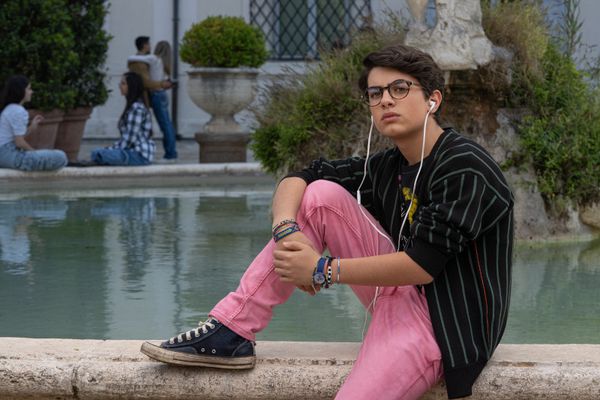Eye For Film >> Movies >> The Boy With Pink Pants (2024) Film Review
The Boy With Pink Pants
Reviewed by: Amber Wilkinson

This film about the all-too short real life of Italian schoolboy Andrea Spezzacatena illustrates how heartfelt and fastidious commitment to a story doesn't always make for engaging cinema, no matter how good the intent. The screenplay by writer Robert Proia, based on the book by Andrea's mother Teresa Manes, is so diligent that it refuses to cut any element out of Andrea's life, whereas a fictional story might have become more streamlined and less unwieldy. Director Margherita Ferri also leans heavily into emotion at every opportunity, which threatens to stall the film in places.
We hear Andrea in a retrospective voiceover from the start, indicating early on that he is no longer with us. It is therefore no spoiler to say that he was the first documented victim of cyberbullying in Italy when he took his own life. That was in 2012 but the culture of cyberbullying continues globally, with the latest Ofcom research in the UK indicating one in four children has experienced bullying either on or offline, with 84% saying it had happened via a device.

The film begins with his mother Teresa (Claudia Pandolfi) giving birth after a long labour which, in a mark of the general feel of the film, has the sort of gauzy sunniness that Disney often brings to its live-action fare. Given that the film indicates Andrea may, like many teenagers, have been sexually curious, but stops short of suggesting he identified as gay, it's unfortunate to see his father Tommaso (Corrado Fortuna) declaring: "See, he came out!" when he's finally born.
Samuele Carrino is well cast as the young Andrea, however, as he brings both a sweet-faced innocence and intelligence to the role. Initially, it seems that the film might focus on the impact of his parents’ declining relationship on Andrea and his younger brother but this is really a tale of the toxic nature of school bullying, a realm in which it doesn't matter whether a label is accurate or not - it still sticks.
Young Andrea is regarded as a bit of a nerd, scoring highly in tests and a key part of the school choir. He is best buddies with Sara (Sara Ciocca, stealing just about ever scene), with the pair of them bonding over a shared love of cinema. This is another area where the screenplay becomes baggy as the filmmakers can’t resist multiple scenes of the pair of them watching films, including, notably Jules et Jim. The love triangle subject of that is clearly intended to be a signpost for the thrust of the film after tall and good looking fellow choir and classmate Christian (Andrea Arru) enters the equation. Andrea wants to, at minimum, be his friend, while Sara also feels an attraction.
Christian is typical of the manipulative sorts that often crop up in school movies - a stereotype for good reason since they are also found in most schools. Successful at sport but a lunkhead in the classroom, he sees friendship with Andrea as a transactional way of improving his grades. Early indications that Christian isn’t beyond making a joke at Andrea’s expense do not bode well and, later, things sharply escalate, with the colour of the trousers of the title just the tip of the iceberg.
One of the areas where the film succeeds is in avoiding stereotyping Andrea. He is essentially a normal teenager, who enjoys sports as much as books. He wears the pink trousers because he thinks they’re cool, not because of any gender identification, it’s others who lay that at his door. Proia and Ferri also sensibly avoid having any scenes showing suicide or the consideration of it, focusing instead on Andrea's vibrant life. This is not only sensible given the target audience but also highlights the way such acts can come from the blue for people around someone like Andrea, who find out what is going on after the event.
The storytelling, however, lacks finesse. The marital breakdown never fully knits with the school plot and the father and brother virtually disappear part way through the film. Stylistically, Ferri overuses slow motion, particularly to show Andrea walking away from the camera, perhaps trying to make up for the lack of psychological insight into his character from the script.
The Boy In Pink Pants does have a strong message for teenagers at its heart that what may seem like innocent ‘fun’ can have a lasting effect. It seems that may be more strongly needed than ever, since the Rome premiere of the film was reportedly marred by homophobic heckling. One thing that is beyond doubt is that this film loves Andrea as much as Andrea loved film, the biggest tragedy is that he isn’t here to see it.
Reviewed on: 21 Nov 2024
















